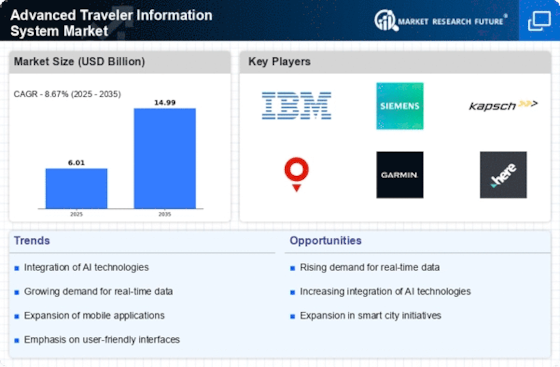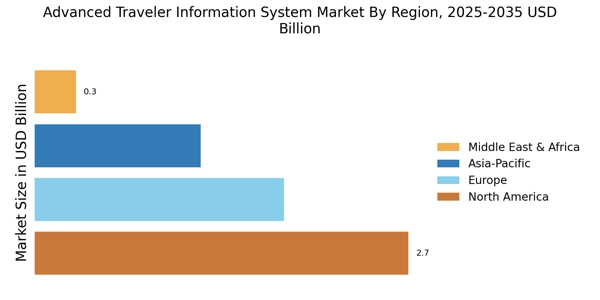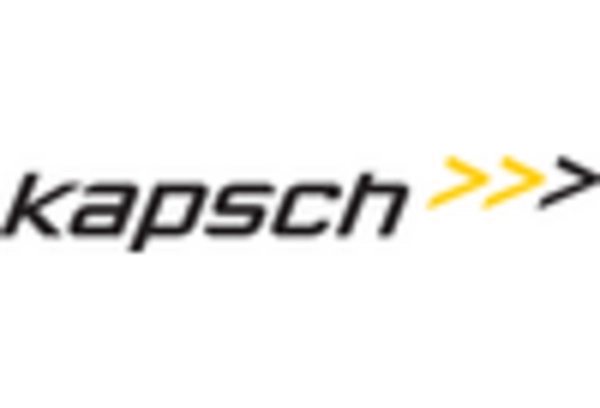Government Initiatives and Funding
Government initiatives play a significant role in propelling the Advanced Traveler Information System Market. Various governments are increasingly recognizing the importance of intelligent transportation systems in improving road safety and efficiency. Funding programs aimed at developing and implementing advanced traveler information systems are being established. For instance, in recent years, several countries have allocated substantial budgets to enhance their transportation infrastructure, with a focus on integrating smart technologies. This financial support not only facilitates the deployment of advanced traveler information systems but also encourages public-private partnerships. As a result, the market is likely to witness accelerated growth, driven by these governmental efforts to modernize transportation networks and improve user experience.
Rising Demand for Enhanced User Experience
The demand for an enhanced user experience is a critical driver for the Advanced Traveler Information System Market. As travelers increasingly seek convenience and efficiency, the expectation for real-time information has surged. Advanced traveler information systems cater to this need by providing timely updates on traffic conditions, route optimization, and alternative transportation options. Recent studies indicate that over 70% of commuters prefer using applications that offer real-time data to plan their journeys. This shift in consumer behavior is prompting transportation agencies and private companies to invest in advanced traveler information systems. By prioritizing user experience, these systems not only improve satisfaction but also encourage more individuals to utilize public transportation, thereby reducing congestion and environmental impact.
Growing Urbanization and Traffic Congestion
The increasing trend of urbanization is a pivotal driver for the Advanced Traveler Information System Market. As more individuals migrate to urban areas, the demand for efficient transportation solutions escalates. Traffic congestion has become a pressing issue, leading to longer travel times and increased fuel consumption. According to recent data, urban areas are projected to experience a 60% increase in population by 2030, intensifying the need for advanced traveler information systems. These systems provide real-time updates on traffic conditions, helping commuters make informed decisions. Consequently, municipalities are investing in these technologies to alleviate congestion and enhance overall mobility. The integration of advanced traveler information systems is thus seen as a crucial strategy to manage urban traffic effectively.
Technological Advancements in Communication
Technological advancements in communication are significantly influencing the Advanced Traveler Information System Market. The proliferation of mobile devices and the expansion of high-speed internet access have transformed how travelers receive information. Advanced traveler information systems leverage these technologies to deliver real-time updates directly to users' smartphones and other devices. The integration of GPS technology and mobile applications has made it easier for commuters to access critical information on the go. Furthermore, the rise of connected vehicles is expected to enhance the capabilities of these systems, allowing for seamless communication between vehicles and infrastructure. This technological evolution is likely to drive the adoption of advanced traveler information systems, as users increasingly rely on instant access to travel-related data.
Environmental Concerns and Sustainability Initiatives
Environmental concerns are becoming a prominent driver for the Advanced Traveler Information System Market. As awareness of climate change and pollution grows, there is a pressing need for sustainable transportation solutions. Advanced traveler information systems contribute to this goal by promoting efficient travel patterns and reducing emissions. By providing real-time data on traffic conditions and alternative routes, these systems encourage users to make environmentally friendly choices. Recent reports suggest that implementing advanced traveler information systems can lead to a reduction in vehicle emissions by up to 20%. Consequently, transportation agencies are increasingly adopting these systems as part of their sustainability initiatives, aiming to create greener urban environments and improve air quality.

















